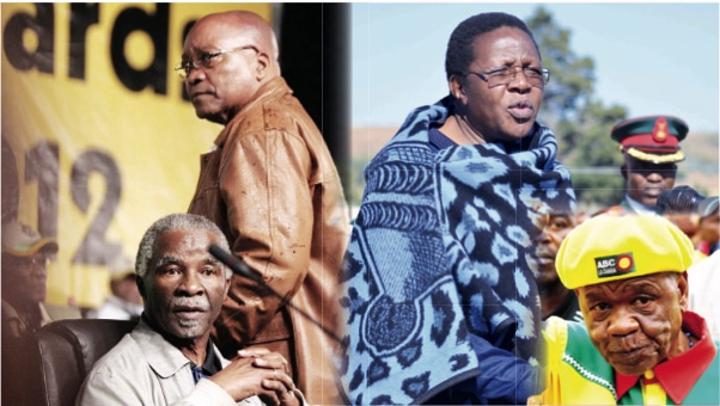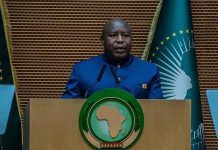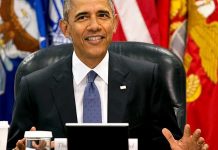Africa-Press – Lesotho. Writer and philosopher George Santayana, in one of his most quoted seminal moments, is said to have coined the expression: “Those who do not learn from history are doomed to repeat it”.
If the Harvard University philosophy teacher’s argument is true and if history, driven by human foibles, is ugly, then this saying ought to guide the nations’ public and private policy.
At its 1997 Mafikeng conference, the African National Congress (ANC) was defined by the ascension of then crown prince, Thabo Mbeki, to the presidency.
Then ANC doyen, Nelson Mandela said in his address: “One of the temptations of a leader who has been elected unopposed is that he may use his powerful position to settle scores with his detractors, to marginalise them and in some cases get rid of them, and to surround himself with yes-men and women…
“The leader must keep the forces together but you can’t do that unless you allow dissent… People should be able to criticise the leader without fear or favour.
Only in that case are you likely to keep your colleagues together. ” Mandela added: “I know our President (Mbeki) understands these issues. He is not the kind of man to sideline anyone”.
Ironically, this was to be the very reason for Mbeki’s downfall 10 years later in Polokwane. But between then, Mbeki used his immense power to systematically eliminate potential rivals.
Cyril Ramaphosa, Tokyo Sexwale and Matthews Phosa, all prominent businessmen, were placed under investigation for allegedly plotting to assassinate Mbeki.
Crucially, Jacob Zuma who had expected to succeed Mbeki, was implicated in the now infamous arms deal culminating in his jettisoning from government for corruption.
While they remained president and deputy president of the ANC, the organisation split and convulsed as their battle for power intensified. According to observers, it was the paranoid side of Mbeki that ended his 52 year career in the ANC – 10 years as president.
He was brought down by his erstwhile comrades, and those who had been hiding in plain sight, observers say. In his 2005 book, journalist William Gumede describes Mbeki as a paranoid control freak whose ruthless silencing of critics attracted a backlash from the left and disenfranchised poor.
“Never was his paranoia more apparent than when he announced that his former rivals – Ramaphosa, Sexwale and (Mathews) Phosa – were conspiring to oust him in 2001,” Gumede wrote in his book titled Thabo Mbeki And The Battle For The Soul Of The ANC.
For the remainder of his tenure as ANC leader, Mbeki – “the master of innuendo”, consolidated his power and beat down potential challengers, ignoring Mandela’s warning at Mafikeng.
This is a piece of history the All Basotho Convention (ABC) and its founding leader Thomas Thabane – who has been elected unchallenged three consecutive times, the last being in February this year – ought to learn from.
It is this Mbeki history that Thabane seems to forget, as his critics argue, as he inches slowly towards senility and paranoia. At the February conference, outgoing National University of Lesotho (NUL) Vice Chancellor Professor Nqosa Mahao was elected deputy leader of the ABC but Thabane has obstinately refused to allow Mahao to assume office.
Mahao won the hotly contested position against Thabane’s wishes. A few days after the conference, Thabane axed his law and constitutional affairs minister Lebohang Hlaele and social development minister Matebatso Doti from his cabinet.
Hlaele, who is married to Thabane’s daughter, had contested for the ABC’s coveted secretary-general position during the conference, and won by a landslide.
Doti had successfully contested the position of deputy spokesperson. It was then speculated that Thabane axed Doti and Hlaele because of their open support for Mahao.
His obstinate refusal to acknowledge his newly-elected deputy has plunged the local political milieu into a tailspin and, as he has admitted himself, poses a clear and present danger to his coalition government formed almost two years ago.
Political Analyst Dr Fako Likoti told Public Eye when the battle between Thabane and Mahao started that Thabane views himself as the undisputed and untouchable Oracle of the party – the source of all wisdom.
“He likes to be surrounded by ‘yes men’,” Likoti said, a mould that the fiercely independent Mahao can’t fit into. Mahao has extensive managerial and leadership experience spanning more than 17 years.
Leader of the Popular Front for Democracy (PFD) advocate Lekhetho Rakuoane told Public Eye that Mahao is “a professional, and this is probably why some members of ABC, including their leader, are opposed to his election because they are crooks and are intimidated by experts”.
Before joining the ABC, Mahao was a member of the PFD. Rakuoane said of him: “His election (as ABC deputy leader) has probably evoked some anxiety and anger amongst the crooks who have controlled ABC since it was established.
Thato Ponya, an ABC stalwart who sympathises with Mahao, said Thabane’s inner circle which is holding onto power has convinced him that he is vulnerable and needs protection at all cost, no matter the consequences to the standing of the ABC.
In March, government spokesperson Nthakeng Pheello Selinyane reportedly explained how some party members go about threatening those who want to be elected to the top-echelons of the party.
Selinyane allegedly said those who are seen to want to be deputies of party leader Thabane “are shot down by the establishment, the party itself”. “They are shot down from the headquarters,” Selinyane said.
He said that “in that milieu, in that atmosphere, nobody could survive showing any interest of becoming a deputy” to Thabane. Since he defied this unwritten charter, Mahao has found himself having to deftly sidestep landmines laid in his path to Met Cash House.
If he is not being called a turncoat, a Johnny-come-lately or a rag, Mahao is being forced to rush to court to assert that his election to the national executive committee of the ABC was above board.
Because of these internal schisms, the ABC now is gradually losing the reasonably peaceful relationship it used to enjoy with citizens before and after winning power in June 2017.
The trust and goodwill of communities towards ABC is slowly ebbing away. Thabane’s stance may be baffling to newcomers to Lesotho politics but not to discerning and experienced watchers.
He is a dictator, experienced watchers argue, and has reverted to type as he is known to do when faced with a stubborn obstacle. In an article in 2016, eight years after he fell from grace, Mbeki lashed out at people who had accused him of being paranoid while he was in office. Will Thabane suffer the same fate as the paranoid Mbeki?
For More News And Analysis About Lesotho Follow Africa-Press






